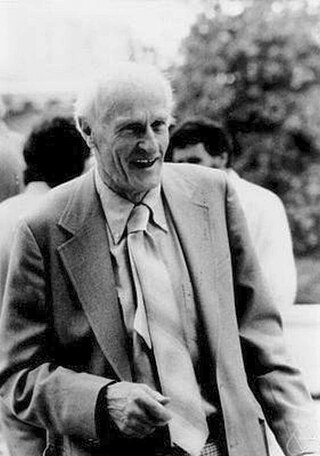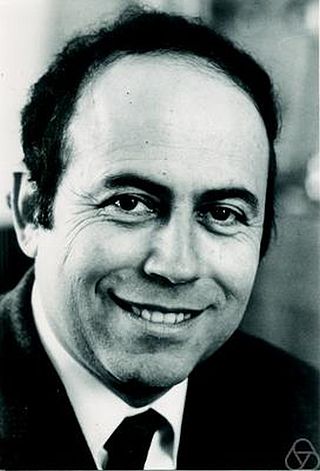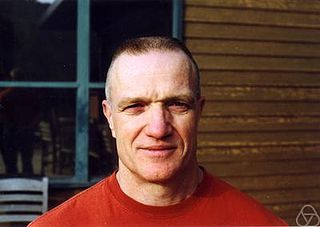Related Research Articles

Stephen Cole Kleene was an American mathematician. One of the students of Alonzo Church, Kleene, along with Rózsa Péter, Alan Turing, Emil Post, and others, is best known as a founder of the branch of mathematical logic known as recursion theory, which subsequently helped to provide the foundations of theoretical computer science. Kleene's work grounds the study of computable functions. A number of mathematical concepts are named after him: Kleene hierarchy, Kleene algebra, the Kleene star, Kleene's recursion theorem and the Kleene fixed-point theorem. He also invented regular expressions in 1951 to describe McCulloch-Pitts neural networks, and made significant contributions to the foundations of mathematical intuitionism.

Stephen Arthur Cook is an American-Canadian computer scientist and mathematician who has made significant contributions to the fields of complexity theory and proof complexity. He is a university professor emeritus at the University of Toronto, Department of Computer Science and Department of Mathematics.
Computability theory, also known as recursion theory, is a branch of mathematical logic, computer science, and the theory of computation that originated in the 1930s with the study of computable functions and Turing degrees. The field has since expanded to include the study of generalized computability and definability. In these areas, computability theory overlaps with proof theory and effective descriptive set theory.

Michael Oser Rabin is an Israeli mathematician, computer scientist, and recipient of the Turing Award.

Richard Manning Karp is an American computer scientist and computational theorist at the University of California, Berkeley. He is most notable for his research in the theory of algorithms, for which he received a Turing Award in 1985, The Benjamin Franklin Medal in Computer and Cognitive Science in 2004, and the Kyoto Prize in 2008.
Robert M. Haralick is Distinguished Professor in Computer Science at Graduate Center of the City University of New York (CUNY). Haralick is one of the leading figures in computer vision, pattern recognition, and image analysis. He is a Fellow of the Institute of Electrical and Electronics Engineers (IEEE) and a Fellow and past president of the International Association for Pattern Recognition. Professor Haralick is the King-Sun Fu Prize winner of 2016, "for contributions in image analysis, including remote sensing, texture analysis, mathematical morphology, consistent labeling, and system performance evaluation".
John R. Myhill Sr. was a British mathematician.

Robert Irving Soare is an American mathematician. He is the Paul Snowden Russell Distinguished Service Professor of Mathematics and Computer Science at the University of Chicago, where he has been on the faculty since 1967. He proved, together with Carl Jockusch, the low basis theorem, and has done other work in mathematical logic, primarily in the area of computability theory.
Anil Nerode is an American mathematician, known for his work in mathematical logic and for his many-decades tenure as a professor at Cornell University.

The Columbian College of Arts and Sciences is the college of liberal arts and sciences of the George Washington University, in Washington, D.C. CCAS is the largest school at George Washington University, with around 5,000 undergraduate students and 2,500 graduate students, and 42 academic departments, representing a significant portion of the University's instructional, scholarly and research activity.

Robert Leamon Bryant is an American mathematician. He works at Duke University and specializes in differential geometry.

Louise Hay was a French-born American mathematician. Her work focused on recursively enumerable sets and computational complexity theory, which was influential with both Soviet and US mathematicians in the 1970s. When she was appointed head of the mathematics department at the University of Illinois at Chicago, she was the only woman to head a math department at a major research university in her era.
Anne Elizabeth Condon, is an Irish-Canadian computer scientist, professor, and former head of the Computer Science Department of the University of British Columbia. Her research focuses on computational complexity theory, DNA computing, and bioinformatics. She has also held the NSERC/General Motors Canada Chair for Women in Science and Engineering (CWSE) from 2004 to 2009, and has worked to improve the success of women in the sciences and engineering.

Rodney Graham Downey is a New Zealand and Australian mathematician and computer scientist, an emeritus professor in the School of Mathematics and Statistics at Victoria University of Wellington in New Zealand. He is known for his work in mathematical logic and computational complexity theory, and in particular for founding the field of parameterised complexity together with Michael Fellows.

Julia Frandsen Knight is an American mathematician, specializing in model theory and computability theory. She is the Charles L. Huisking Professor of Mathematics at the University of Notre Dame and director of the graduate program in mathematics there.

Mohammad Taghi Hajiaghayi is a computer scientist known for his work in algorithms, game theory, social networks, network design, graph theory, and big data. He has over 200 publications with over 185 collaborators and 10 issued patents.

Tatiana Toro is a Colombian-American mathematician at the University of Washington. Her research is "at the interface of geometric measure theory, harmonic analysis and partial differential equations". Toro was appointed director of the Simons Laufer Mathematical Sciences Institute for 2022–2027.
Keith A. Crandall is an American computational biologist, bioinformaticist, and population geneticist at George Washington University, where he is the founding director of the Computational Biology Institute, and professor in the Department of Biostatistics and Bioinformatics.
Bakhadyr M. Khoussainov is a computer scientist and mathematician, who was born and educated in the Soviet Union, works in the fields of mathematical logic, computability theory, computable model theory and theoretical computer science. With Anil Nerode, he is the co-founder of the theory of automatic structures, which is an extension of the theory of automatic groups.
Jeffrey Brian Remmel was an American mathematician employed by the University of California, San Diego. At the time of his death he held a distinguished professorship—his title was Distinguished Professor of Mathematics; he also held a position as a professor of computer science.
References
- 1 2 Harizanov, V.S. (1987). "Degree Spectrum of a Recursive Relation on a Recursive Structure". Ph.D. Dissertation, University of Wisconsin–Madison.
- ↑ Valentina Harizanov at the Mathematics Genealogy Project
- 1 2 3 "Curriculum Vitae of Valentina Harizanov" (PDF). The George Washington University . Retrieved 15 January 2018.
- ↑ "Award Abstract #0904101: Topics in Computable Mathematics". National Science Foundation . Retrieved 15 January 2018.
- ↑ "Trachtenberg Research Award Winners". The George Washington University . Retrieved 15 January 2018.
- ↑ "Oscar and Shoshana Trachtenberg Prize for Faculty Scholarship (Research)". The George Washington University . Retrieved 15 January 2018.
- ↑ MSRI. "Mathematical Sciences Research Institute". www.msri.org. Retrieved 2021-06-07.